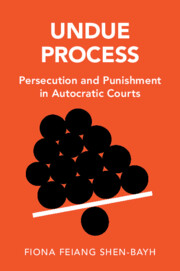1 - The Process of Punishment
Published online by Cambridge University Press: 01 September 2022
Summary
Why do autocrats use courts to repress when the outcomes are presumed known from the start? This chapter introduces the puzzle of political trials in autocratic regimes and provides a theoretical framework for rethinking repression from a judicial perspective. I introduce the main theory, which is outlined in three parts: the function of political trials, who goes to trial, and the dynamics of a cooperative judiciary. I then explain the analytical approach and empirical focus of the book: comparative historical analysis of postcolonial regimes in postcolonial Anglophone Africa.
Keywords
- Type
- Chapter
- Information
- Undue ProcessPersecution and Punishment in Autocratic Courts, pp. 1 - 25Publisher: Cambridge University PressPrint publication year: 2022

